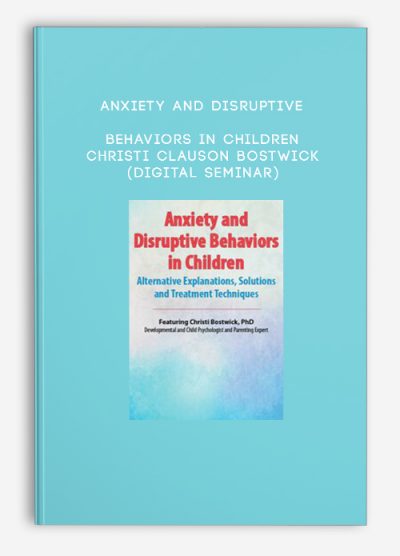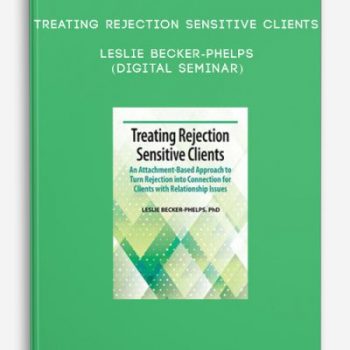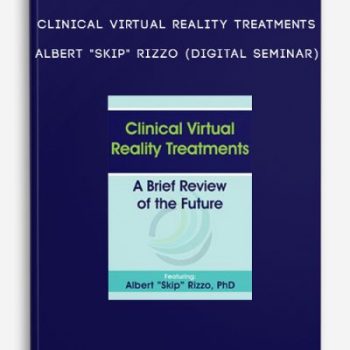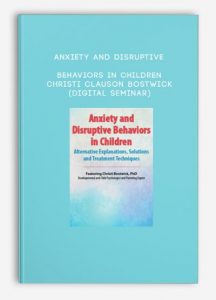Anxiety and Disruptive Behaviors in Children – CHRISTI CLAUSON BOSTWICK (Digital Seminar)
Description:
Children’s behavior sometimes just does not make sense. They may behave great at school and then trash the house when they get home. They may wake at night with terrors even though nothing disruptive seems to be going on during the day. Nice parents with out of control kids are difficult to figure out.
Dr. Bostwick has worked with children and their parents for over 25 years conducting research and providing cognitive behavioral solutions to even the most puzzling behavior. Common childhood milestones can become challenging if a child doesn’t behave as we would expect. Dr. Bostwick will show you how anxiety and unexpected behavior can be a side effect of other problems you may not have considered. Kids with baffling behavior are often resistant to tried and true treatment options for anxiety and behavior disorders.
Watch Dr. Bostwick, who has done the hard work for you, in this recording! She’ll share developmentally appropriate considerations and techniques on how to proceed with highly sensitive childhood behavior:
- Suicidal five-year-old
- Child running the household and parents walking on eggshells
- 3-year-old who has just been kicked out of her second daycare
- 6-year-old tells you they hear voices or see things that are not there
Dr. Bostwick will help you create real and positive long term change that promotes healthy development from childhood into adolescence and beyond! Don’t miss an opportunity to learn from her.
Outline:
Considerations to Improve Your Diagnostic Accuracy When Treating Children with Anxiety
- Role of development
- Therapeutic setting
- Clinical interviews with young children
- Avoidant behavior
- Children 0-2
- Helpful therapeutic aids
Strategies for Therapeutic Flexibility
- Gain rapport, read what needs to happen
- ”Get down on the floor”
- When parents should and shouldn’t stay
- Discussing sensitive information
- When to request separate session with parents: Rookie mistakes
Behavior Management Techniques – Foundational Principles
- Objectives
- Types of attention and how they help or inhibit parental control
- Essential techniques to avoid
- Essential techniques to include
Strategies for Differential Diagnoses in Children: Anxiety or a Symptom of Something Else?
Anxiety
- Healthy developmental trajectory
- Adult versus childhood anxiety
- Translating research-based calming techniques to other settings
- Adjustment disorders
- Generalized Anxiety Disorder
- Panic
ADHD
- Can be diagnosed at four years of age, but should it be?
- Hyperactivity trajectory
- Inattention trajectory
- Is ADHD really an attention deficit?
Encopresis
- What is it – Why you need to Know
- Other toileting difficulties
- Genetic predisposition to constipation/constipation in infancy
- Toileting refusal
- Stool withholding
Sensory Processing Deficits
- The immature neurological system
- World as sandpaper – sensory processing issues to consider
Learning Difficulties
- Dyslexia
- Dysgraphia
- Dyscalculia
- ADHD
Advanced Cognitive Ability
- Aggression in highly intelligent children
- Intellectually eccentric child
NLP online course
So what is NLP?
NLP stands for Neuro-Linguistic Programming. Neuro refers to your neurology;
Linguistic refers to language; programming refers to how that neural language functions.
In other words, learning NLP is like learning the language of your own mind!
NLP is the study of excellent communication–both with yourself, and with others.
It was developed by modeling excellent communicators and therapists who got results with their clients.
NLP is a set of tools and techniques, but it is so much more than that.
It is an attitude and a methodology of knowing how to achieve your goals and get results
Preview Information:
Original Page
Archive Page
More Course: NLP – HYPNOSIS – PHILOSOPHY
Outstanding Course:Monroe Institute (Hemi-Sync) – Do This Now














Lord –
This is Digital Download service, the course is available at Vincourse.com and Email download delivery.